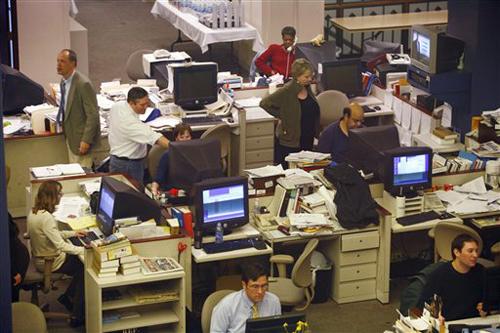Tribune accepts $8.2B buyout offer from Zell, plans to sell Cubs

The city and photo desks at the Chicago Tribune are shown Thursday, March 29, 2007, in Chicago. Tribune Co. has accepted a buyout offer from real estate investor Sam Zell in a deal valued at about $8.2 billion and plans to sell the Chicago Cubs at the end Drake Baer
Apr 2, 2007
Last updated on May 12, 2016 at 09:16 a.m.
CHICAGO (AP) – Tribune Co. has accepted a buyout offer from real estate investor Sam Zell in a deal valued at about $8.2 billion and plans to sell the Chicago Cubs at the end of this season, the media company said Monday.
The owner of the Chicago Tribune, Los Angeles Times, and various other newspapers and TV stations spent six months soliciting bids and reviewing offers.
Tribune had set a self-imposed March 31 deadline to announce a spin-off, buyout or reorganization.
In addition to the Zell bid, the Tribune considered a competing offer from Los Angeles billionaires Eli Broad and Ron Burkle.
Get The Daily Illini in your inbox!
The company has been under pressure from key shareholders to boost its stock price and, along with others in the newspaper industry, has been losing readers and advertisers to the Internet. Tribune is the nation’s second biggest newspaper publisher after Gannett Co.
Tribune said Zell plans to invest $315 million in the deal and will eventually become chairman of the Chicago-based company’s board when the buyout is complete sometime in the fourth quarter.
The buyout will be conducted as a two-part deal, the company said. The first stage, expected to be completed in the second quarter, will involve a cash tender offer of $34 per share for 126 million shares, more than half of the outstanding Tribune shares. The remaining shares will be purchased later at the same $34 per share price.
Broad and Burkle also had offered $34-per-share, and the company’s board reportedly spent much of the weekend sifting through the two offers.
Tribune has about 240 million shares outstanding, according to a regulatory filing.
“The strategic review process was rigorous and thorough,” William Osborn, a Tribune director who led the review process, said in a statement. “We determined that this course of action provides the greatest certainty for achieving the highest value for all shareholders and is in the best interest of investors and employees.”
The deal already has the support of two of Tribune’s largest shareholders, including the Chandler family, which has about a 20 percent stake in the media company.
Charles Bobrinskoy, vice chairman of Ariel Capital Management, said his money management firm also would support the Zell deal. Ariel Capital owns about 6.1 percent of Tribune shares.
“These are clearly challenging times for all newspaper companies, but we’re very pleased by today’s announcement and plan to support the proposed transaction,” Bobrinskoy said.
But opponents of media consolidation predicted a staunch fight with regulators in Washington, especially regarding Tribune’s cross-ownership of TV stations and newspapers in the same media market.
“There will be fierce opposition to the sale and it will be used as a vehicle to underscore the fight over media consolidation at the FCC and in Congress,” said Andy Schwartzman, president of Washington-based Media Access Project.
Tribune said Zell will use an employee stock ownership plan to finance part of the deal and lower the taxes on any sale. The ESOP, which resembles a profit-sharing plan, will become the majority owner of Tribune once the deal is complete. Zell will be entitled to buy 40 percent of the company’s common stock.
“I am delighted to be associated with Tribune Company, which I believe is a world-class publishing and broadcasting enterprise,” Zell said in a statement. “As a long-term investor, I look forward to partnering with the management and employees as we build on the great heritage of Tribune Company.”
An ESOP allows the company to borrow money and repay loans using pretax dollars. Payments of both interest and principle are tax-deductible and would create more leverage for a buyer.
“The ESOP can only help pay down this mountain of debt with a positive corporate culture that drives performance but does not deflate the motivation of workers,” said Joseph Blasi, a professor at Rutgers University who is an expert on the structures.
Bear Stearns analyst Alexia Quadrani said after the deal is completed, Tribune will have about $13.4 billion in net debt.
“After an exhaustive six-month review we believe this complicated and heavily levered transaction is another indication of the waning interest in the newspaper business given the ongoing secular challenges that are weighing on the fundamental outlook,” she wrote in a research note published Monday.
Zell, 65, made his fortune reviving moribund real estate. After a bidding war culminated in February, he sold his company, Equity Office, to the private equity firm Blackstone Group for $23 billion.
If Tribune decides to accept another buyout offer before its shareholders approve the deal, the company will have to pay Zell a $25 million breakup fee.
Experts said that low figure would easily allow Broad and Burkle to submit another counter bid, but that prospect seemed unlikely.
“Tribune’s board of directors has at least for the time being left the door open for other proposals,” said James Walden, a Morningstar analyst. “I’d be disappointed if they were just trying to rush through things to meet their self-imposed deadline.”
Tribune shares climbed 85 cents, or 2.7 percent, to $32.96 in midday trading Monday on the New York Stock Exchange.





